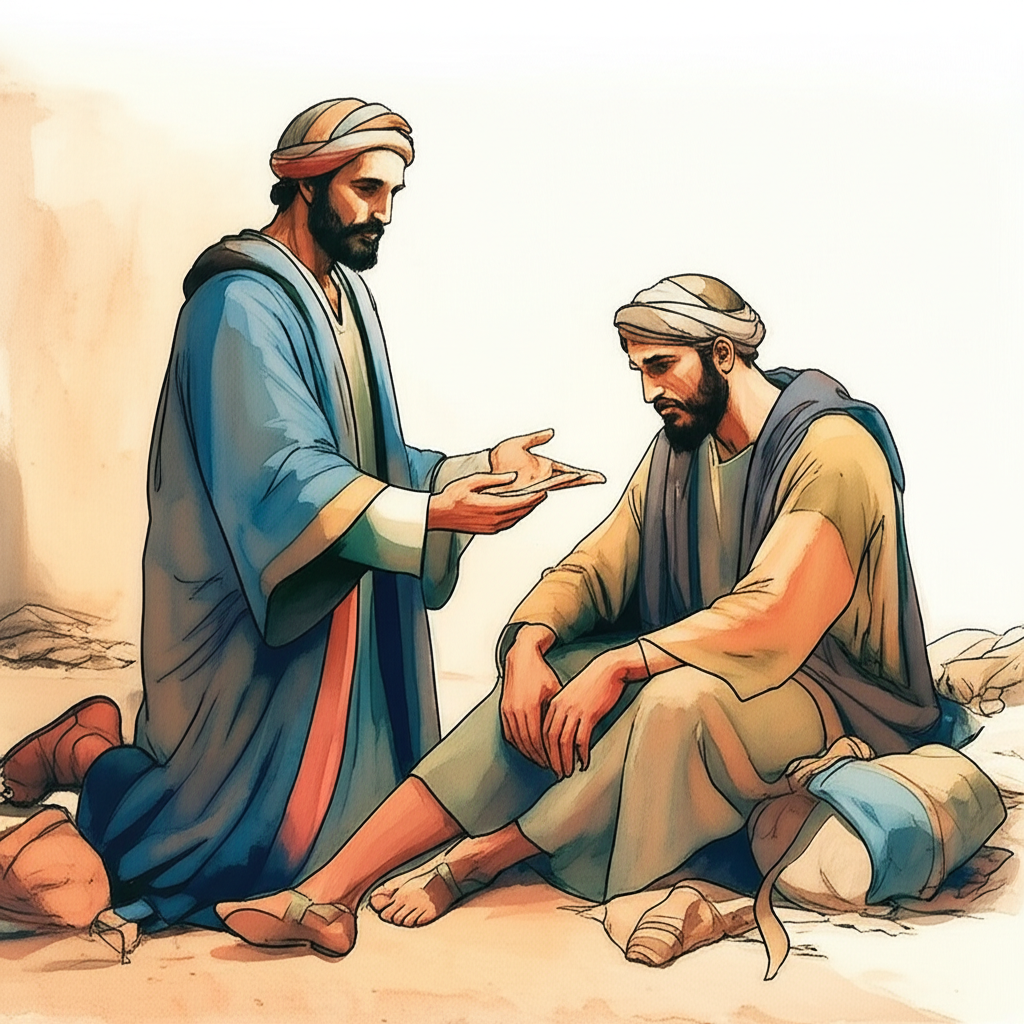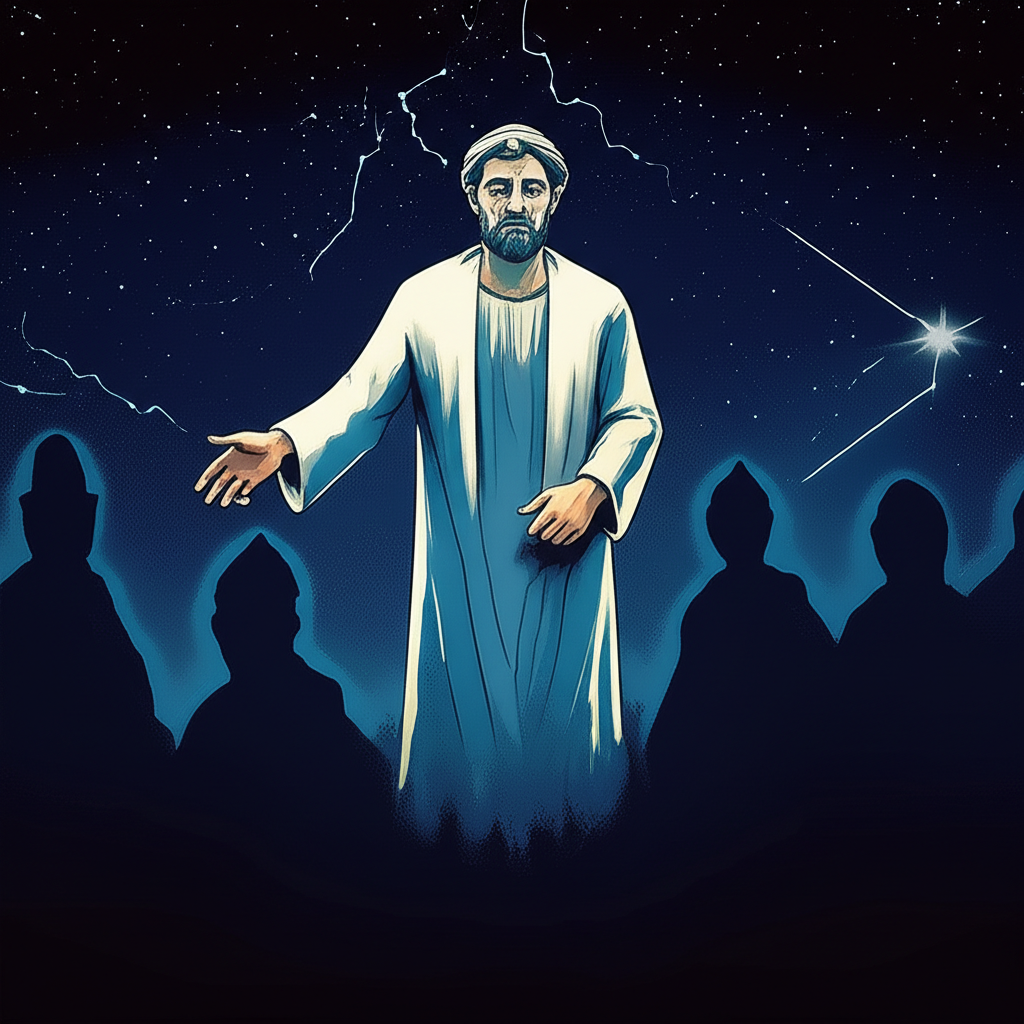Job 4 meaning explained in AI Summary
In Job chapter 4, Eliphaz the Temanite, one of Job's friends who has come to comfort him, takes his turn to speak. However, instead of offering true comfort, Eliphaz begins to subtly imply that Job's suffering is his own fault.
Here are the key points of his speech:
- Doubt in Job's righteousness (4:1-6): Eliphaz starts by gently questioning Job's innocence. He argues that good people don't usually suffer like this, implying that Job must have done something to deserve his fate. He reminds Job of how he used to counsel others in their distress and questions why he can't comfort himself now.
- Human frailty and God's justice (4:7-11): Eliphaz emphasizes the inherent weakness and mortality of humans. He argues that no one is truly righteous before God and everyone is prone to sin. He uses the image of a mighty lion being brought down to illustrate how even the strongest can fall due to their wickedness.
- A vision of divine judgment (4:12-21): Eliphaz recounts a terrifying vision he received where a spirit whispered to him about God's judgment on the wicked. The spirit emphasizes that those who rebel against God will be punished, even if they seem powerful and secure.
Essentially, Eliphaz presents a theology of retribution, suggesting that suffering is a direct consequence of sin. While he doesn't directly accuse Job, his words plant seeds of doubt and imply that Job needs to examine his own actions to understand his current situation. This sets the stage for the ongoing debate about suffering and God's justice that unfolds throughout the book.
Job 4 bible study ai commentary
Eliphaz the Temanite opens the first cycle of speeches, representing the voice of established, traditional wisdom. His discourse, while starting with a gentle tone, quickly pivots to a rigid theological framework: the doctrine of retribution. He argues from experience, tradition, and a terrifying night vision that suffering is invariably the consequence of sin. Therefore, Job's immense suffering must point to some great, hidden iniquity. Eliphaz presents truths about God's holiness and human frailty but misapplies them, turning theology into a weapon against a man in agony.
Job 4 Context
The setting is the Ancient Near East, where the concept of divine retribution (gods punishing evil and rewarding good) was a common theological foundation, not unique to Israel. Eliphaz, from Teman in Edom, was from a land renowned for wisdom (Jeremiah 49:7). His argument is presented as the height of human observation and even special revelation. His speech, therefore, carries the weight of respected tradition, making its failure to address Job's reality all the more significant. The book of Job acts as a polemic against the oversimplified application of this doctrine.
Job 4:1-2
Then Eliphaz the Temanite answered and said: “If one ventures a word with you, will you be weary? Yet who can keep from speaking?
In-depth-analysis
- This is a polite, almost apologetic, opening, a common rhetorical device. Eliphaz acknowledges Job's fragile state ("will you be weary?").
- However, the second phrase, "Yet who can keep from speaking?" reveals his true intent. He feels compelled by Job's outburst in chapter 3 to correct him.
- The gentleness is a veneer for a firm, corrective agenda. He sees Job's lament not as an expression of pain, but as a theological error that must be addressed.
Bible references
- Proverbs 25:11: "A word fitly spoken is like apples of gold in a setting of silver." (This is what Eliphaz attempts to do, but fails because his words, though seemingly wise, are misapplied).
- Galatians 6:2: "Bear one another's burdens..." (Eliphaz doesn't bear Job's burden but adds to it with his theology).
Cross references
2 Tim 4:2 (be ready to preach), Prov 15:23 (joy in a timely answer), Jas 1:19 (be slow to speak).
Job 4:3-6
“Behold, you have instructed many, and you have strengthened the weak hands. Your words have upheld him who was stumbling, and you have made firm the feeble knees. But now it has come to you, and you are impatient; it touches you, and you are dismayed. Is not your fear of God your confidence, and the integrity of your ways your hope?
In-depth-analysis
- Verses 3-4: Eliphaz begins with praise, recalling Job's reputation as a wise and encouraging counselor. This has a dual effect: it appears respectful but also sets Job up for a fall. The implication is, "You could dish it out, but you can't take it."
- Verse 5: The pivot point. Eliphaz points out the hypocrisy (in his eyes) of Job's despair. Now that trouble (it) has touched Job directly, he fails his own test.
- Verse 6: This is the heart of the accusation, framed as a question. "Is not your fear of God your confidence?" If Job's piety (fear of God, integrity) was genuine, Eliphaz argues, he would still have hope and confidence, not despair. He implies Job's faith was shallow, only sufficient for when things were good.
- Word: The Hebrew for "fear of God" (yirʼāh) is the foundation of Old Testament piety. By questioning it as Job's confidence (kislāh), Eliphaz questions the very core of Job's relationship with God.
Bible references
- Isaiah 35:3: "Strengthen the weak hands, and make firm the feeble knees." (Eliphaz quotes a sentiment common in prophetic encouragement, using Job's own past actions against him).
- Hebrews 12:12-13: "Therefore lift your drooping hands and strengthen your weak knees..." (Shows the proper, encouraging use of this language, which contrasts with Eliphaz's critical use).
- James 1:2-4: "Count it all joy... when you meet trials of various kinds, for you know that the testing of your faith produces steadfastness." (This is the ideal response Eliphaz expects, but he lacks the compassion to help Job get there).
Cross references
Job 1:1 (Job's integrity), Job 2:9 (Job's wife questions his integrity), Job 3:25 (Job's fears realized), 1 Pet 4:12 (don't be surprised by fiery trials).
Job 4:7
“Remember now, who that was innocent ever perished? Or where were the upright cut off?
In-depth-analysis
- This is Eliphaz's central theological thesis, the bedrock of his and the other friends' arguments: the doctrine of strict, observable retribution.
- He poses a rhetorical question, assuming the answer is "no one." He appeals to tradition and common observation.
- This statement is a dangerous half-truth. While wickedness often leads to ruin, the book's prologue (chapters 1-2) and countless other scriptures show that the righteous do suffer. Eliphaz's worldview has no room for the mystery of innocent suffering.
Bible references
- Psalm 37:25: "I have been young, and now am old, yet I have not seen the righteous forsaken or his children begging for bread." (This is the traditional wisdom Eliphaz is channeling. The Psalms, however, also contain cries from the righteous who feel forsaken, e.g., Ps 22).
- Luke 13:4-5: "...those eighteen on whom the tower in Siloam fell and killed them: do you think that they were worse offenders... No, I tell you..." (Jesus directly refutes Eliphaz's simplistic logic).
- John 9:2-3: "'Rabbi, who sinned, this man or his parents, that he was born blind?' Jesus answered, 'It was not that this man sinned, or his parents, but that the works of God might be displayed in him.'" (The ultimate rebuttal to the friends' theology).
Cross references
Prov 11:21 (the wicked will not go unpunished), Psa 1:6 (the way of the wicked will perish), Prov 24:16 (the righteous falls seven times and rises again).
Job 4:8-11
“As I have seen, those who plow iniquity and sow trouble reap the same. By the breath of God they perish, and by the blast of his anger they are consumed. The roar of the lion, the voice of the fierce lion, the teeth of the young lions are broken. The strong lion perishes for lack of prey, and the cubs of the lioness are scattered.”
In-depth-analysis
- Verses 8-9: Eliphaz uses the agricultural metaphor of sowing and reaping, a common biblical analogy for cause and effect. His conclusion: Job must have sown iniquity to be reaping such a harvest of destruction.
- Word: The "breath of God" (neshamah) and "blast of his anger" (ruach) describe divine power as a destructive force against the wicked. This same word, ruach, will appear as "spirit" in his vision, linking God's power to the vision's message.
- Verses 10-11: He uses a five-fold description of lions (a symbol of strength, ferocity, and royalty) to illustrate his point. Even the most powerful and self-sufficient predators are broken and scattered by God. This implies that no matter how powerful Job was, his ruin proves he was wicked and opposed by God.
Bible references
- Galatians 6:7-8: "Do not be deceived: God is not mocked, for whatever one sows, that will he also reap." (Paul uses the same principle but in the context of walking by the Spirit vs. the flesh, not to judge a sufferer).
- Hosea 8:7: "For they sow the wind, and they shall reap the whirlwind." (A classic expression of the sowing/reaping principle applied to national sin).
- 1 Peter 5:8: "Your adversary the devil prowls around like a roaring lion, seeking someone to devour." (Peter uses the lion as a symbol of evil, which aligns with Eliphaz's use, though Eliphaz is implicitly calling Job's family a pride of wicked lions).
Cross references
Prov 22:8 (he who sows injustice will reap calamity), Psa 58:6 (O God, break the teeth in their mouths), Hos 13:7-8 (God as a lion to a sinful Israel).
Job 4:12-21
“Now a word was brought to me in secret; my ear received a whisper of it. Amid thoughts from visions of the night, when deep sleep falls on men, dread came upon me, and trembling, which made all my bones shake. A spirit glided past my face; the hair of my flesh stood up. It stood still, but I could not discern its appearance. A form was before my eyes; there was silence, then I heard a voice: ‘Can mortal man be in the right before God? Can a man be pure before his Maker? Even in his servants he puts no trust, and his angels he charges with error; how much more those who dwell in houses of clay, whose foundation is in the dust, who are crushed like the moth. Between morning and evening they are beaten to pieces; they perish forever without anyone regarding it. Is not their tent-cord plucked up within them; do they not die, and not in wisdom?’”
In-depth-analysis
- The Vision's Authority (vv. 12-16): Eliphaz now claims supernatural authority for his argument. He presents a mysterious, terrifying nocturnal experience. This isn't a normal dream; it has the hallmarks of a prophetic encounter (terror, a spiritual presence, a disembodied voice). This move is meant to silence all rebuttal.
- Word: The "spirit" (rûaḥ) that glides by is deliberately ambiguous. It is not identified as the Spirit of God, but a spirit. The atmosphere is one of terror, not peace, raising questions about its origin.
- The Divine Message (v. 17): This is the core revelation: "Can mortal man be in the right before God?" (ʼĕnôš - mortal, frail man). The answer is, of course, no. This theological statement is absolutely true on its own. The problem is not the statement's truth but its cruel and inappropriate application to Job as the sole explanation for his suffering.
- The A Fortiori Argument (vv. 18-21): Eliphaz reasons from the greater to the lesser ("how much more"). If God finds flaws even in angels (celestial beings), how much more flawed must fragile humans be?
- "Houses of clay": A powerful metaphor for the human body, formed from dust (Gen 2:7) and inherently fragile.
- "Crushed like the moth": Highlights the ease and speed with which human life is extinguished.
- "Tent-cord plucked up": An image of sudden death, like a tent collapsing when its main rope is cut. Life ends abruptly, "not in wisdom," implying they die without understanding why. Eliphaz uses this to explain why Job suffers without explanation—because he is just another fragile, flawed human.
Bible references
- 2 Corinthians 4:7: "But we have this treasure in jars of clay, to show that the surpassing power belongs to God and not to us." (Paul uses the same "clay" imagery, not to prove human worthlessness, but to highlight God's power being magnified through human weakness).
- 2 Peter 2:4: "For if God did not spare angels when they sinned, but cast them into hell and committed them to chains of gloomy darkness..." (Confirms Eliphaz's point in v. 18 that God holds even his heavenly servants accountable for error).
- Psalm 90:3, 5-6: "You return man to dust... You sweep them away as with a flood; they are like a dream, like grass that is renewed in the morning... in the evening it fades and withers." (Moses's prayer echoes the theme of human frailty and fleeting life).
- Isaiah 38:12: "My dwelling is plucked up and removed from me like a shepherd's tent..." (Hezekiah uses the same "tent" metaphor to describe his near-death experience).
Cross references
Job 9:2 (Job agrees man cannot be righteous before God), Job 15:15 (Eliphaz repeats this point later), Job 25:4-6 (Bildad makes the same argument), Gen 18:27 (Abraham calls himself "dust and ashes"), Rom 3:23 (all have sinned), Dan 10:8-9 (Daniel's terror during a true divine vision).
Polemics
Many scholars question the source of Eliphaz's vision. Unlike genuine divine encounters in the Bible which often end with a message of hope, purpose, or commissioning (cf. Isaiah 6, Ezekiel 1), this vision offers only a crushing, hopeless assessment of humanity. Its message is a truth used as a club. Some commentators suggest this was not a divine vision but a deceiving spirit, as its fruit was accusation and condemnation, not restoration (1 John 4:1 "test the spirits"). Eliphaz receives a "truth" but lacks the divine wisdom to apply it correctly.
Job chapter 4 analysis
- The Flawed "Helper": Eliphaz models the danger of a technically correct theology that lacks compassion and situational wisdom. He diagnoses Job's "sickness" (impatience and despair) and applies the wrong medicine (accusation and condemnation).
- Truth as a Weapon: The chapter is a masterclass in how truth can be weaponized. The central claims—that the wicked are punished, God is holy, and man is frail—are all biblically sound. However, Eliphaz strings them together to build an inescapable, false conclusion: Job is a secret sinner receiving his just punishment.
- Sources of Authority: Eliphaz grounds his argument in three sources: experience ("As I have seen," v. 8), tradition ("Remember now," v. 7), and supernatural revelation (the vision, vv. 12-16). The Book of Job challenges the adequacy of all three when they contradict the reality of a person's life and integrity.
- A Deceptive Spirit? A profound theological question raised is whether Eliphaz's vision was from God or a deceiving spirit. The vision's content is a truth, but its effect is to condemn the righteous. Satan, the "accuser of the brethren" (Rev 12:10), also uses truth to accuse. Eliphaz, without realizing it, may be channeling an argument from the Accuser himself, echoing the charges of Job 1-2.
Job 4 summary
Eliphaz, the first of Job's friends to speak, begins with feigned gentleness but quickly confronts Job's lament. He argues from experience that the innocent do not perish, so Job's suffering must be punishment for sin. To support this, he recounts a terrifying night vision whose message was that no mortal can be pure before God. If even angels are flawed, he concludes, fragile humans ("houses of clay") are surely crushed for their inherent, if hidden, faults. His speech applies orthodox truths in a cruel, unhelpful, and ultimately wrong-headed way.
Job 4 AI Image Audio and Video










Job chapter 4 kjv
- 1 Then Eliphaz the Temanite answered and said,
- 2 If we assay to commune with thee, wilt thou be grieved? but who can withhold himself from speaking?
- 3 Behold, thou hast instructed many, and thou hast strengthened the weak hands.
- 4 Thy words have upholden him that was falling, and thou hast strengthened the feeble knees.
- 5 But now it is come upon thee, and thou faintest; it toucheth thee, and thou art troubled.
- 6 Is not this thy fear, thy confidence, thy hope, and the uprightness of thy ways?
- 7 Remember, I pray thee, who ever perished, being innocent? or where were the righteous cut off?
- 8 Even as I have seen, they that plow iniquity, and sow wickedness, reap the same.
- 9 By the blast of God they perish, and by the breath of his nostrils are they consumed.
- 10 The roaring of the lion, and the voice of the fierce lion, and the teeth of the young lions, are broken.
- 11 The old lion perisheth for lack of prey, and the stout lion's whelps are scattered abroad.
- 12 Now a thing was secretly brought to me, and mine ear received a little thereof.
- 13 In thoughts from the visions of the night, when deep sleep falleth on men,
- 14 Fear came upon me, and trembling, which made all my bones to shake.
- 15 Then a spirit passed before my face; the hair of my flesh stood up:
- 16 It stood still, but I could not discern the form thereof: an image was before mine eyes, there was silence, and I heard a voice, saying,
- 17 Shall mortal man be more just than God? shall a man be more pure than his maker?
- 18 Behold, he put no trust in his servants; and his angels he charged with folly:
- 19 How much less in them that dwell in houses of clay, whose foundation is in the dust, which are crushed before the moth?
- 20 They are destroyed from morning to evening: they perish for ever without any regarding it.
- 21 Doth not their excellency which is in them go away? they die, even without wisdom.
Job chapter 4 nkjv
- 1 Then Eliphaz the Temanite answered and said:
- 2 "If one attempts a word with you, will you become weary? But who can withhold himself from speaking?
- 3 Surely you have instructed many, And you have strengthened weak hands.
- 4 Your words have upheld him who was stumbling, And you have strengthened the feeble knees;
- 5 But now it comes upon you, and you are weary; It touches you, and you are troubled.
- 6 Is not your reverence your confidence? And the integrity of your ways your hope?
- 7 "Remember now, who ever perished being innocent? Or where were the upright ever cut off?
- 8 Even as I have seen, Those who plow iniquity And sow trouble reap the same.
- 9 By the blast of God they perish, And by the breath of His anger they are consumed.
- 10 The roaring of the lion, The voice of the fierce lion, And the teeth of the young lions are broken.
- 11 The old lion perishes for lack of prey, And the cubs of the lioness are scattered.
- 12 "Now a word was secretly brought to me, And my ear received a whisper of it.
- 13 In disquieting thoughts from the visions of the night, When deep sleep falls on men,
- 14 Fear came upon me, and trembling, Which made all my bones shake.
- 15 Then a spirit passed before my face; The hair on my body stood up.
- 16 It stood still, But I could not discern its appearance. A form was before my eyes; There was silence; Then I heard a voice saying:
- 17 'Can a mortal be more righteous than God? Can a man be more pure than his Maker?
- 18 If He puts no trust in His servants, If He charges His angels with error,
- 19 How much more those who dwell in houses of clay, Whose foundation is in the dust, Who are crushed before a moth?
- 20 They are broken in pieces from morning till evening; They perish forever, with no one regarding.
- 21 Does not their own excellence go away? They die, even without wisdom.'
Job chapter 4 niv
- 1 Then Eliphaz the Temanite replied:
- 2 "If someone ventures a word with you, will you be impatient? But who can keep from speaking?
- 3 Think how you have instructed many, how you have strengthened feeble hands.
- 4 Your words have supported those who stumbled; you have strengthened faltering knees.
- 5 But now trouble comes to you, and you are discouraged; it strikes you, and you are dismayed.
- 6 Should not your piety be your confidence and your blameless ways your hope?
- 7 "Consider now: Who, being innocent, has ever perished? Where were the upright ever destroyed?
- 8 As I have observed, those who plow evil and those who sow trouble reap it.
- 9 At the breath of God they perish; at the blast of his anger they are no more.
- 10 The lions may roar and growl, yet the teeth of the great lions are broken.
- 11 The lion perishes for lack of prey, and the cubs of the lioness are scattered.
- 12 "A word was secretly brought to me, my ears caught a whisper of it.
- 13 Amid disquieting dreams in the night, when deep sleep falls on people,
- 14 fear and trembling seized me and made all my bones shake.
- 15 A spirit glided past my face, and the hair on my body stood on end.
- 16 It stopped, but I could not tell what it was. A form stood before my eyes, and I heard a hushed voice:
- 17 'Can a mortal be more righteous than God? Can even a strong man be more pure than his Maker?
- 18 If God places no trust in his servants, if he charges his angels with error,
- 19 how much more those who live in houses of clay, whose foundations are in the dust, who are crushed more readily than a moth!
- 20 Between dawn and dusk they are broken to pieces; unnoticed, they perish forever.
- 21 Are not the cords of their tent pulled up, so that they die without wisdom?'
Job chapter 4 esv
- 1 Then Eliphaz the Temanite answered and said:
- 2 "If one ventures a word with you, will you be impatient? Yet who can keep from speaking?
- 3 Behold, you have instructed many, and you have strengthened the weak hands.
- 4 Your words have upheld him who was stumbling, and you have made firm the feeble knees.
- 5 But now it has come to you, and you are impatient; it touches you, and you are dismayed.
- 6 Is not your fear of God your confidence, and the integrity of your ways your hope?
- 7 "Remember: who that was innocent ever perished? Or where were the upright cut off?
- 8 As I have seen, those who plow iniquity and sow trouble reap the same.
- 9 By the breath of God they perish, and by the blast of his anger they are consumed.
- 10 The roar of the lion, the voice of the fierce lion, the teeth of the young lions are broken.
- 11 The strong lion perishes for lack of prey, and the cubs of the lioness are scattered.
- 12 "Now a word was brought to me stealthily; my ear received the whisper of it.
- 13 Amid thoughts from visions of the night, when deep sleep falls on men,
- 14 dread came upon me, and trembling, which made all my bones shake.
- 15 A spirit glided past my face; the hair of my flesh stood up.
- 16 It stood still, but I could not discern its appearance. A form was before my eyes; there was silence, then I heard a voice:
- 17 'Can mortal man be in the right before God? Can a man be pure before his Maker?
- 18 Even in his servants he puts no trust, and his angels he charges with error;
- 19 how much more those who dwell in houses of clay, whose foundation is in the dust, who are crushed like the moth.
- 20 Between morning and evening they are beaten to pieces; they perish forever without anyone regarding it.
- 21 Is not their tent-cord plucked up within them, do they not die, and that without wisdom?'
Job chapter 4 nlt
- 1 Then Eliphaz the Temanite replied to Job:
- 2 "Will you be patient and let me say a word?
For who could keep from speaking out? - 3 "In the past you have encouraged many people;
you have strengthened those who were weak. - 4 Your words have supported those who were falling;
you encouraged those with shaky knees. - 5 But now when trouble strikes, you lose heart.
You are terrified when it touches you. - 6 Doesn't your reverence for God give you confidence?
Doesn't your life of integrity give you hope? - 7 "Stop and think! Do the innocent die?
When have the upright been destroyed? - 8 My experience shows that those who plant trouble
and cultivate evil will harvest the same. - 9 A breath from God destroys them.
They vanish in a blast of his anger. - 10 The lion roars and the wildcat snarls,
but the teeth of strong lions will be broken. - 11 The fierce lion will starve for lack of prey,
and the cubs of the lioness will be scattered. - 12 "This truth was given to me in secret,
as though whispered in my ear. - 13 It came to me in a disturbing vision at night,
when people are in a deep sleep. - 14 Fear gripped me,
and my bones trembled. - 15 A spirit swept past my face,
and my hair stood on end. - 16 The spirit stopped, but I couldn't see its shape.
There was a form before my eyes.
In the silence I heard a voice say, - 17 'Can a mortal be innocent before God?
Can anyone be pure before the Creator?' - 18 "If God does not trust his own angels
and has charged his messengers with foolishness, - 19 how much less will he trust people made of clay!
They are made of dust, crushed as easily as a moth. - 20 They are alive in the morning but dead by evening,
gone forever without a trace. - 21 Their tent-cords are pulled and the tent collapses,
and they die in ignorance.
- Bible Book of Job
- 1 Story of Job
- 2 Satan Attacks Job's Health
- 3 Job Laments His Birth
- 4 Eliphaz Speaks: The Innocent Prosper
- 5 Call now; is there anyone who will answer you? To which of the holy ones will
- 6 Job Replies: My Complaint Is Just
- 7 Job Continues: My Life Has No Hope
- 8 Bildad Speaks: Job Should Repent
- 9 Job Replies: There Is No Arbiter
- 10 Job Continues: A Plea to God
- 11 Zophar Speaks: You Deserve Worse
- 12 Job Replies: The Lord Has Done This
- 13 Job Continues: Still I Will Hope in God
- 14 Job Continues: Death Comes Soon to All
- 15 Eliphaz Accuses: Job Does Not Fear God
- 16 Job Replies: Miserable Comforters Are You
- 17 Job Continues: Where Then Is My Hope?
- 18 Bildad Speaks: God Punishes the Wicked
- 19 Job Replies: My Redeemer Lives
- 20 Zophar Speaks: The Wicked Will Suffer
- 21 Job Replies: The Wicked Do Prosper
- 22 Eliphaz Speaks: Job's Wickedness Is Great
- 23 Job Replies: Where Is God?
- 24 Why are not times of judgment kept by the Almighty, and why do those who know
- 25 Bildad Speaks: Man Cannot Be Righteous
- 26 Job Replies: God's Majesty Is Unsearchable
- 27 Job Continues: I Will Maintain My Integrity
- 28 Job Continues: Where Is Wisdom?
- 29 Job's Summary Defense
- 30 But now they laugh at me, men who are younger than I, whose fathers I would
- 31 Covenant with my Eyes
- 32 Elihu Rebukes Job's Three Friends
- 33 Elihu Rebukes Job
- 34 Elihu Asserts God's Justice
- 35 Elihu Condemns Job
- 36 Elihu Extols God's Greatness
- 37 Elihu Proclaims God's Majesty
- 38 Job questions God
- 39 Do you know when the mountain goats give birth? Do you observe the calving of
- 40 Job Promises Silence
- 41 Lord's challenge of Leviathan
- 42 Job's Repentance and Restoration